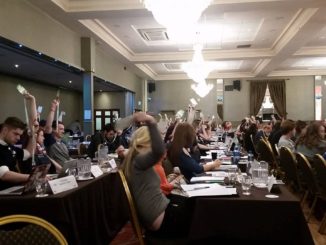
Around 6,995 Irish people have taken their own lives by suicide, over a 13 year period from 2000 to 2013. In addition to this figure, the number of patients reporting to A&E following incidents of self-harm have risen 6 percent since the recession began.
In 2014, hospitals registered 11,126 incidents of self-harm from 8,708 individuals.
Research carried out by The Royal College of Surgeons has found that one in five young people are experiencing a mental health issue, while AWARE, the national suicide charity, estimate that more than 450,000 are suffering from depression.
In 2012, over two million prescriptions for the top five antidepressants were written for 331,368 medical card holders. Factoring in the 350,000 plus prescriptions dispensed under different schemes and the number of people who access antidepressants on the black market, and up to half a million people are taking anti-depressants – or just over one tenth of the population.
The announcement therefore of the Government to cut €12 million of the €35 million earmarked for investment in mental health has angered the public and raised serious questions about government commitment to the provision of mental health services.
The idea that the Government could not find €12 million from someplace else without resorting to pillaging money from such a sensitive area, illustrates the depth of their commitment to responding to a very serious public health concern which needs urgent financing.
Minister for Heath Leo Varadkar has defended the diversion by pointing out that spending on mental health services has increased from €711 million in 2011 to €792 million this year. What he doesn’t mention however, is that spending is still €145 million below pre-crisis levels, despite a population increase of 400,000 in the same period.
Protest organised by Mental Health Reform and USI outside the Dáil earlier today on €12m budget cuts. pic.twitter.com/RJEYOYUOjp
— The College View (@thecollegeview) April 28, 2016
Responding to this, Director of Mental Health Reform Dr Shari McDaid said: “The diversion of any mental health funding was unacceptable and should not be tolerated. Ring-fenced funding for mental health should not be viewed as a pot of money to prop up other areas of the health service.”
‘A Vision of Change’ is Ireland’s national mental health care policy document which was first published in 2006 to assist in reforming the abysmal provision of mental health services throughout the country. According to a review of its implementation carried out by Trinity College Dublin, it was noted: “If it was fully implemented the mental health budget would be expected to account for 8.25 percent of overall on-going health spending”
Instead they noted: “Spending on mental health services between 2006 and 2012 averaged 6.11 percent of overall health spending. Spending decreased from 7.2 percent in 2006 to 5.2 percent in 2012’ and it increased slightly to 5.3 percent in 2013.”
To fully implement ‘A Vision for Change’, it was recommended that 1,800 new staff would be required. However, Mental Health Reform note that current staffing levels exist only at 75 percent of what is required to adequately treat the staggering number of people availing of mental health services.
This is a very serious issue, especially for young people who face increasing challenges. 19.5 percent of people aged 19-24 have had a mental health disorder and 75 percent of mental health difficulties arise before age 25. This has led to Union of Union of Students Ireland (USI) President Kevin Donoghue warned that if funding isn’t brought up to adequate levels it will endanger lives: “Students and young people have been repeatedly told there isn’t money to invest in the services they need – be it education, decent work or anything else.”
One of many impassioned speeches at today's @TheUSI protests outside the Dáil for cuts to metal health funding. pic.twitter.com/ve1oeZyLXa
— The College View (@thecollegeview) April 28, 2016
Donoghue added that: “We’ve had the word ‘recovery’ jammed down our throats for 12 months and now they are stripping funding from a vital, under supported service. The damage this will cause is irreversible. At the end of the day access to these services is vital in saving lives.”
Ultimately this all comes down to priorities. The €12 million represents 0.015 percent of the total cost of bailing out the banks. The cost of which necessitated the whole-scale gutting of public services like health, education and transport. Over 8 austerity budgets have dramatically scaled back investment in essential public services leading to crisis levels within these areas.
The crisis within our healthcare service, the homeless crisis and the shameful retreat of the state from its public service duty are not mere accidents. These acts represent the inevitable human cost of a government who have chosen to prioritise marginal financial interests, to wield disproportionate political power at the expense of wider society and its most vulnerable members.
It is no coincidence that those most affected by these cuts are the most vulnerable members of society. The government remains ambivalent to these members of society, and it relies on their disconnection and remains confident in their disempowerment to cause a major political headache.
However, the slashing of mental health services must be seen as particularly egregious given the crisis, and with a faltering government, now is the time to red flag this issue.
Stephen McCabe
Image Credit: The Irish Times




Leave a Reply